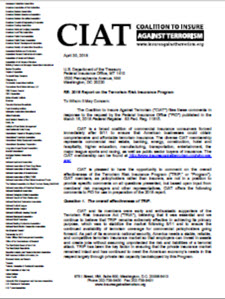The Roundtable and its partners in the Coalition to Insure Against Terrorism (CIAT), submitted detailed comments Monday on the overall effectiveness of the Terrorism Risk Insurance Program (TRIP) to the U.S. Department of Treasury's Federal Insurance Office (FIO).
 |
This week's comments support TRIP as a "tremendous success" yet provide recommendations on three primary aspects of the program: Standalone terrorism insurance; Nuclear, Biological, Chemical or Radiological (NBCR) availability; and Cyber terrorism. |
The Terrorism Risk Insurance Program Reauthorization Act of 2015 (TRIPRA) requires Treasury to issue proposed rules to implement changes to TRIP, which is set to expire on Dec. 31, 2020 (Roundtable Weekly - Jan. 16, 2015)
As FIO works on preparing its 2018 report on TRIP's effectiveness, the coalition's comment letter presents views from policyholders and risk managers – and supplement earlier remarks submitted by CIAT in 2016 (Roundtable Weekly, June 3, 2016).
This week's comments support TRIP as a "tremendous success" yet provide recommendations on three primary aspects of the program: Standalone terrorism insurance; Nuclear, Biological, Chemical or Radiological (NBCR) availability; and Cyber terrorism.
The CIAT comments note there has been no evidence that private markets can develop adequate terrorism risk capacity without some type of federal participation. The letter also notes that "in the wake of a major terrorist attack, (the program) ensures that a significant portion of the costs of recovery would be borne by the private sector."
The comments also include a suggestion that FIO should consider making the program permanent, stating that most other countries insurance programs are "of continuous duration, and it would benefit market stability to make TRIP permanent as well."
How other nation's implement terrorism risk insurance programs was the focus of a discussion with Julian Enoizi, chief executive of Pool-Re during last week's Spring Roundtable Meeting in Washington, DC.
Additionally, Marsh recently released its 2018 Terrorism Risk Insurance Report, which presents data on purchasing and pricing trends in the terrorism insurance marketplace. The report finds that the highest terrorism insurance take-up rates by industry in 2017 were real estate companies, education entities, health care organizations and financial institutions. It also explores how the terrorism insurance market continues to innovate and respond to the needs of global organizations in light of an evolving risk landscape. (BusinessInsurance, April 20, 2018)
With TRIP set to sunset at the end of 2020, The Roundtable has formed a Terrorism Risk Insurance Working Group to explore potential options in advance of the reauthorization debate that is expected to begin in earnest next year. The Working Group's goal is to develop a strategy for a permanent, or long-term, national terrorism insurance program that would enable policyholders to secure the terrorism risk coverage they need without facing periodic renewals by the government.